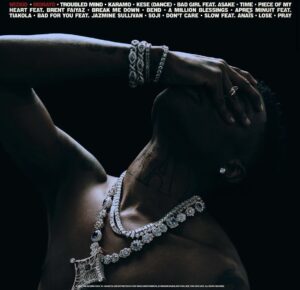Wizkid’s sixth studio album, Morayo, is a heartfelt celebration of life, love, and legacy, shaped by the poignant influence of his late mother’s passing. While Wizkid has often dismissed the “Afrobeats artist” label, claiming a broader creative identity, Morayo is steeped in the very sounds that have defined his career. The project feels like a homecoming, blending his signature breezy flow with a newfound lyrical intentionality that sets it apart as his most mature and deliberate work yet.
An In-Depth Look at Morayo

Wizkid’s 6th studio album begins with Troubled Mind, which is an embodiment of Fuji and modern Yoruba highlife. The song starts out with talking drums and a festive, nostalgic keyboard tune that’s reminiscent of the 80s and 90s. However, this quickly transitions into a drawn out in a drawly saxophone tune backed by Wizkid’s soulful voice and his ever-present choir.
From Troubled Mind, we dive deeper into a blend of African percussion sounds on Karamo. This song starts with a high-energy tease and delivers a satisfying climax loaded with heavy drums and backed by the classic Wizkid drawl.
The next two songs on Wizkid’s Morayo need no introduction. Kese (Dance) and Bad Girl ft. Asake have been making the rounds on social media for a couple of weeks now. They’re both classic high-energy songs that deliver on both lyrical versatility and flow.
If you’ve been craving a feel-good, groove-laden Wizkid track to spice up your playlist, the next song on Morayo delivers in style. Time dials back the tempo, trading a frenetic pulse for a smooth, laid-back rhythm. Here, Wizkid effortlessly glides over the undulating flow of a seemingly endless beat, showcasing his mastery of mood and melody.
On Piece of My Heart, Wizkid features Brent Faiyaz, who adds a much-needed flair to the track. At this point in the album, you can see Wizkid begin to loosen up more while maintaining a good grip on his pen game.
The next song on Wizkid’s Morayo is Break Me Down, a song that borrows heavily from early 2000s Hip-Hop music. It’s followed by Bend, a track that, while showcasing undeniably smooth production, falls short in composition and doesn’t quite make the cut as a personal favorite.
A Million Blessings follows the classic Wizkid trope– a fast beat, bedazzled with the occasional bass drum interjection and the ever-so-present string instrument, which in this case, was a violin.
Moving forward on Morayo, listeners are treated to a beautiful blend of soft Francophone R&B on Apres Minuit, courtesy of Tiakola, the uber-talented French rapper and singer.
Apres Minuit ends as softly as it began, giving way to Bad for You, featuring Jazmine Sullivan. Tracks like this make this writer understand (however so slightly) why Wizkid insists on detaching himself from the Afrobeats identity. There’s no way a track like Bad for You can be classified as Afrobeats without sounding painfully ignorant.
Next up on Morayo is Soji, and it absolutely lives up to its name. This high-energy track aims to to get listeners on their feet and keep them moving for all 2 minutes and 39 seconds of pure, unrelenting rhythm. On Soji, Wizkid trades lyrical depth for rhythm and flow– a decision that boosts the song’s replay value by miles.
Don’t Care stays true to Wizkid’s signature style, sticking to familiar territory. While it doesn’t break new ground, it still delivers the infectious charm and smooth flow fans have come to love and expect.
Don’t Care gives way to Slow featuring the enchanting Anais Cardot, whose soft and sultry voice all but teases the senses. Anais and Wizkid display undeniable chemistry on Slow, with Anais leading and Wizkid following.
The penultimate track on Morayo, Lose, takes a slower, more intimate approach. Its rhythm evokes the imagery of sensual dances in a dimly lit, secluded room—a perfect soundtrack for a moment of quiet passion (or at least that’s how I imagine the visuals would unfold).
Wrapping up Morayo in an entirely different creative direction from Lose, Pray ends the album on a triumphant high. This track grabs attention with its uplifting energy and soulful resonance. Wizkid doesn’t achieve this finale solo; he enlists the power of a choir, creating a rich, harmonious soundscape that brings the album to a warm and memorable close.

Final Thoughts
And that brings us to the close of Starboy’s 6th studio album since his debut. Wizkid’s Morayo stands as one of his most refined and multifaceted projects to date. The album can be described as what the average Nigerian would call bend-down select.
It effortlessly spans a range of genres—Afro-fusion, R&B, Fuji, Afrobeats, and Hip-hop—blending them seamlessly into a cohesive sonic journey that offers something for every listener. With only a select few features, Wizkid demonstrates his confidence in taking center stage, asserting his artistry and vocal command throughout the record.
What’s particularly striking is how Morayo balances its emotional depth without veering into overt melancholy. Although it is inspired by the loss of his mother, the album sidesteps an overly somber tone. Instead, it channels grief into a celebration of life, passion, and resilience. It’s a mature, introspective body of work that still manages to uplift and inspire, further solidifying Wizkid’s place at the forefront of contemporary music.





